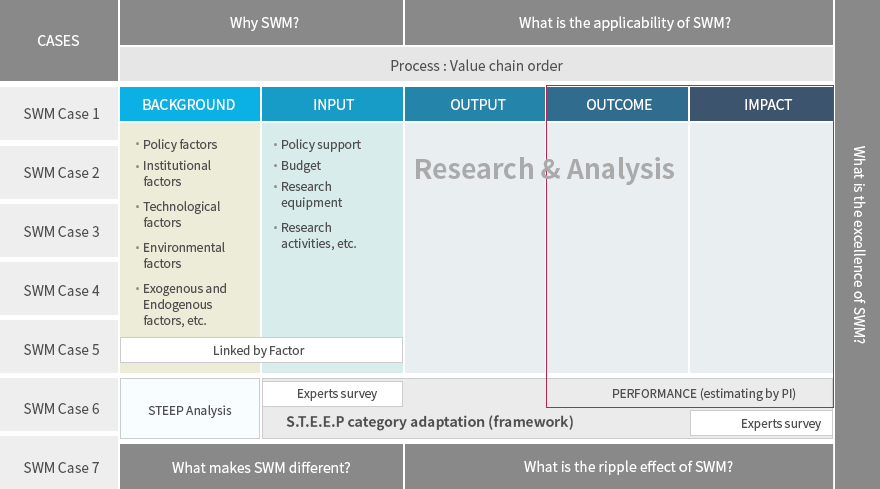WWC Common Projects
Business Cooperation
-
Research Goals
- Leading national water resource management policies, developing global issues, and proposing agendas to the 8th World Water Forum
- Measuring contributions of the SWM to SDGs and exploration of applying the SWM (ICT) to developing countries
- Establishing a long-term technology road map incorporating policy suggestions and applications for realizing the SWM
- Development of best practices to promote superiority of the SWM and its distinct characteristics
-
Implementation Overview
- 2015. Aug. Stockholm MOU agreement to conduct common SWM research
- 2016. Mar. India First AWC Meeting: Presentation of the SWM linked with WP and PFI
- 2016. Jun. Brazil Kick-Off Meeting for the 8th World Water Forum: first operation committee meeting (WWC and K-Water) for turning the SWM into a global agenda
- 2016. Aug. Stockholm International Water Week: presentation of SWM policy
- 2016. Sep. Hawaii 7th Civil Engineering Conference in the Asia Region: panel discussion and presentation of best practices
-
Research Plans
Ongoing Common Studies (Draft)
-
Including in WWC Membership-led Initiatives, these will be implemented in three stages for three years.
* WWC Membership-led Initiatives refer to member organizations of the WWC implementing studies with organizations proposing common studies. However, member organizations focus only on identifying cases. (March 17, 2016 / meeting with Deputy Chairman of WWC)
Ongoing Common Studies (Draft) : PHASE 1, PHASE 2, PHASE 3 PHASE 1 PHASE 2 PHASE 3 Reestablishment of the SWM concept
Development of performance indicators
Conceptualizing a pilot model and identifying cases (Korea)
Completion of a pilot model conceptualization and case identification (focusing on other countries)
Case analysis based on performance indicators
Proposing a guideline / roadmap
executive summary case study publication
Promotion and distribution
-
Analysis(~2016. 9)
STAGE 1
- Environmental analysis of the SWM in Korea and other countries (technology, industry, and policies)
STAGE 2- Examination of cases on the SWM in Korea and other countries
- Identification and selection of best SWM practices in Korea and other countries
- Selection of Best SWM Practice 1 and completion of its analysis
-
Development(2016. 10)
STAGE 3
- Defining an analysis framework
- Composing a performance indicator pool
- Estimation of the degree of importance for each performance indicator
- Finalizing performance indicators
- Establishment of the comprehensive performance analysis system
- Designing an expert opinion survey (beneficiaries, if needed)
-
Apply(2016. 10~11)
STAGE 4
- xamination of materials for each best practice
- Quantitative and qualitative database for each best practice
- Expert opinion survey (beneficiaries, if needed)
-
Verification(2016. 11~12)
- Examination and complementation of qualitative and quantitative database through expert opinions
- Analysis and assessment of each best practice
-
Uses(2016. 12)
- Identifying technological policy directions in Korea and other countries
- Preparing agendas and detailed implementation strategies in Korea and other countries

-
Including in WWC Membership-led Initiatives, these will be implemented in three stages for three years.
